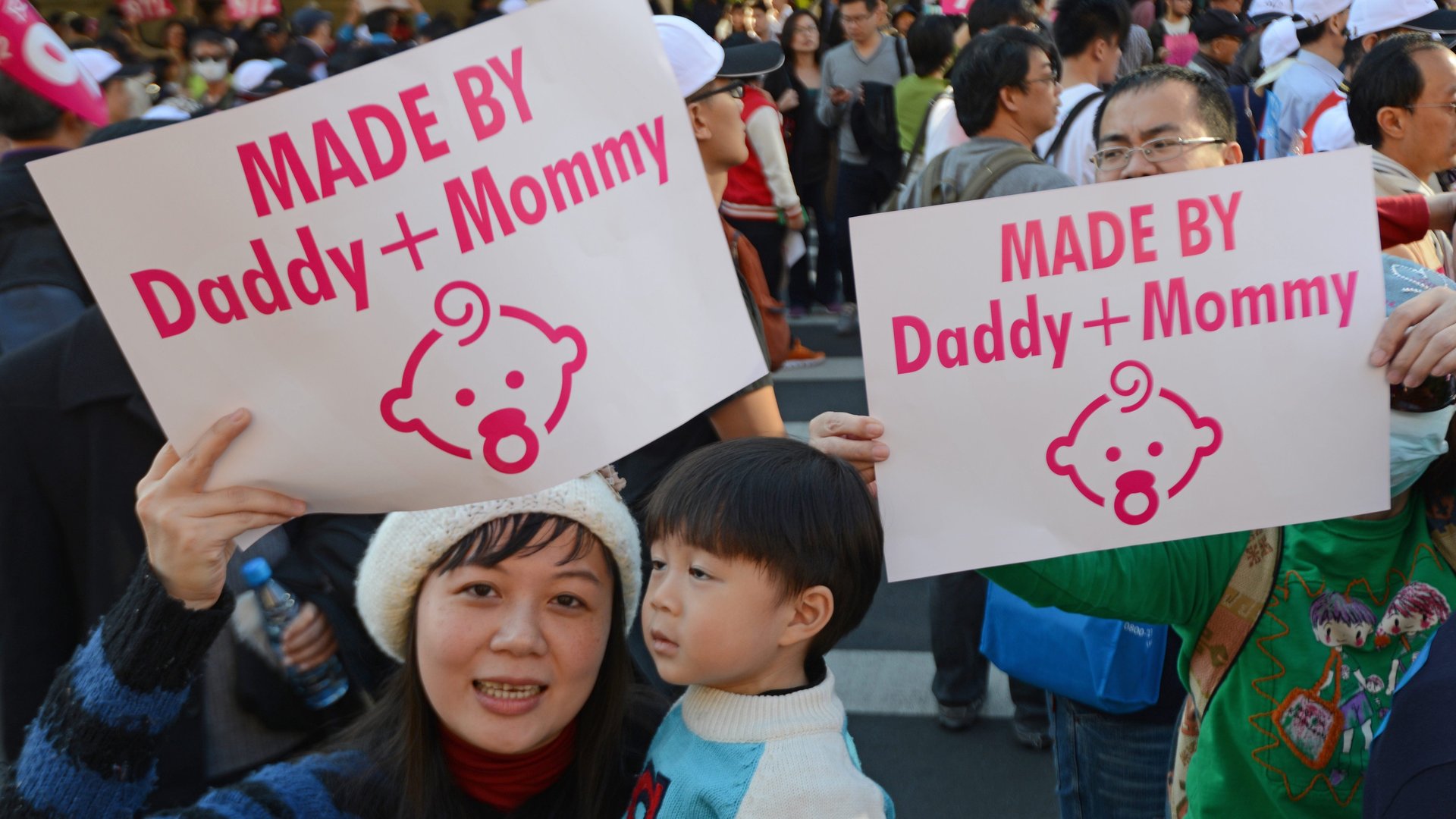Taiwan’s president is battling a deluge of election-linked homophobic fake news
Taiwan is often described as Asia’s most gay-friendly place. It was, after all, the first country in Asia to legalize same-sex marriage. It boasts the biggest Pride event in the region and has a vibrant “pink” economy.


Taiwan is often described as Asia’s most gay-friendly place. It was, after all, the first country in Asia to legalize same-sex marriage. It boasts the biggest Pride event in the region and has a vibrant “pink” economy.
It’s clear, however, that nearly eight months after same-sex marriage became legal, many in Taiwan remain deeply opposed to the law that grants “two persons of the same gender” the right to create a “permanent union.” Ahead of Saturday’s (Jan. 11) presidential and legislative elections, opponents of president Tsai Ing-wen are campaigning against her support for LGBT rights. Tsai publicly backed the law, tweeting #LoveWins the day it passed.
Her opponents are disseminating homophobic false information to discredit Tsai’s record in office. One example is a post that has been circulating on Taiwan’s dominant chat app Line, and on Facebook. It asserts that Tsai’s Democratic Progressive Party (DPP) spent NT$30 million ($980,000) organizing this year’s Pride parade in Taipei, and it features photos of scantily clad men. “Do you want your kids to be like this? Is this how you will cast your vote?” the post asks.
The post was debunked by fact-checking platform MyGoPen (link in Chinese), which said Pride’s organizers paid for it, and that it did not have a political party among its sponsors.
Other social media posts doing the rounds allege that Tsai, who is unmarried, is herself homosexual.
Homophobic fake news is just one front in the bigger war against misinformation in Taiwan. A recent study by the V-Dem Institute at Sweden’s University of Gothenburg found that “among democracies (that) are the target of foreign online disinformation campaigns—the most affected are Taiwan, the United States, Latvia, and many other countries of the former Soviet Bloc.” The study noted that Taiwan is one of the “main targets” (pdf, p. 35) of false and misleading information from China, which claims Taiwan as its own territory.
The fears of fake news are particularly acute in the run-up to the election. Facebook has set up a “war room” in Taipei ahead of Saturday to fight misinformation. But fake news has long been widespread in Taiwan, due to the popularity of closed messaging groups on Line and on Facebook. Many Taiwanese, particularly the elderly—many of whom had never used the internet before—simply forward messages without basic fact-checking.
A similar wave of anti-LGBT fake news flooded Taiwan in November 2018, ahead of a referendum on same-sex marriage. Posts that went viral at the time included ones that linked marriage equality to HIV, and those that suggested legalizing gay marriage would turn Taiwan into a depraved society, with its children vulnerable to rampant pedophilia, and subject to compulsory masturbation lessons in school.
Some of these fears are being provoked all over again in the current election campaign. In November, the wife of the opposition Kuomintang party’s candidate for president, Han Kuo-yu, claimed that a friend had said elementary schools were teaching kids about anal sex and orgasms. The education ministry refuted the claims, and Taiwan’s premier accused Han’s wife of spreading misinformation.
J. Michael Cole, a a Taipei-based analyst at the University of Nottingham’s Taiwan Studies Programme, shared a photo of a “disinformation pamphlet” in Yunlin county in western Taiwan that implored voters not to vote for a candidate from president Tsai’s party. The leaflet claimed that the DPP candidate’s support for gay marriage meant voters would have fewer grandchildren because more Taiwanese would be in same-sex unions.
Though most of the homophobic attacks against Tsai come from the opposition Kuomintang party, Lev Nachman, a doctoral candidate who studies Taiwanese politics at the University of California, Irvine, said that her own DPP may also be the source. He said, many members of Tsai’s own party are against same-sex marriage. “The biggest misconception is that the Kuomintang is the conservative party and the DPP is progressive,” he added.
But Taiwanese elections generally hinge on voter preferences for what kind of China policy they want the government to pursue. “How (Taiwanese) feel about gay people has almost nothing to do with how (they) feel about China,” said Nachman.
In the end, it seems that how voters feel about China will determine the way they vote. The latest poll shows Tsai with a comfortable lead over Han, whose party favors closer ties with China. Tsai’s lead is helped by Beijing’s continuing hardline policy against the island and its iron grip on Hong Kong, which burnish her credentials as a leader committed to protecting Taiwan from Chinese encroachment.